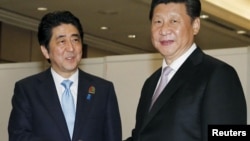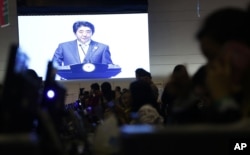Chinese President Xi Jinping and Japanese Prime Minister Shinzo Abe held talks Wednesday at a regional summit in Indonesia, in what was only the second time the two leaders have met since taking power.
The two leaders held a bilateral meeting on the sidelines of the Asian-African Summit in Jakarta, according to Japanese officials, who did not specify how long the meeting lasted or what topics were discussed.
Earlier, Prime Minister Abe and President Xi exchanged greetings and politely shook hands at a photo session to kick off the conference, which many hoped would serve as a chance for Tokyo and Beijing to mend ties.
Strained relations
Relations between the the two powerful Asian nations have been strained over a territorial dispute and what Beijing sees as Tokyo's reluctance to atone for its colonial-era aggression toward China and other Asian neighbors.
In a speech Wednesday, Prime Minister Abe expressed "deep remorse" for Japan's wartime past, but failed to repeat the language used in previous official apologies to the victims of Japan's colonial aggression.
Most notably, the conservative Japanese leader left out a phrase referring to Japan's "heartfelt apology" for its past. He also omitted references to Japan's "colonial rule and aggression."
In the lead-up to the event, the conservative Japanese leader had told local media outlets there was no need for him to reiterate the same landmark apologies made by his predecessors in 1995 and 2005.
Instead, the closely watched speech made only passing reference to Japan's past militarism, noting Tokyo had "feelings of deep remorse over the past war" but insisting its leaders had long ago committed to the principles of peace.
Prime Minister Abe also took a veiled swipe at China, saying the international community should "never allow to go unchecked the use of force by the mightier to twist the weaker around."
China has been accused of using its rising economic and military strength to bully its neighbors into submission and is involved in a worsening dispute with Tokyo over a group of strategic islands in the East China Sea.
Yasukuni Shrine
Another persistent source of irritation is Japanese leaders' insistence on visiting a controversial Tokyo shrine that honors Japan's war dead, including some convicted World War II-era war criminals.
Over 100 Japanese lawmakers paid respects at the Yasukuni Shrine on Wednesday, though the visit's controversy appeared to be lessened because of the absence of any cabinet members.
Abe also refrained from visiting this week, during the shrine's annual spring festival, instead choosing to send a ritual offering. The nationalist leader last visited the shrine in 2013. He defended the move by saying it is natural for him to pay respects to the country's war dead.
Many in China and South Korea see the visits as evidence Japan is unrepentant for colonial-era atrocities committed in their countries.
China's Foreign Ministry on Wednesday said the global community is "looking forward to seeing that Japan can squarely face and reflect upon the history of aggression, so as to improve the reconciliation with neighboring countries in Asia and gain trust from the global community."
South Korea's Foreign Ministry expressed its "deep regret" that Abe did not use the language contained in Japan's prior apologies. "We hope that the Japanese government will not miss remaining opportunities," it said in a statement.






